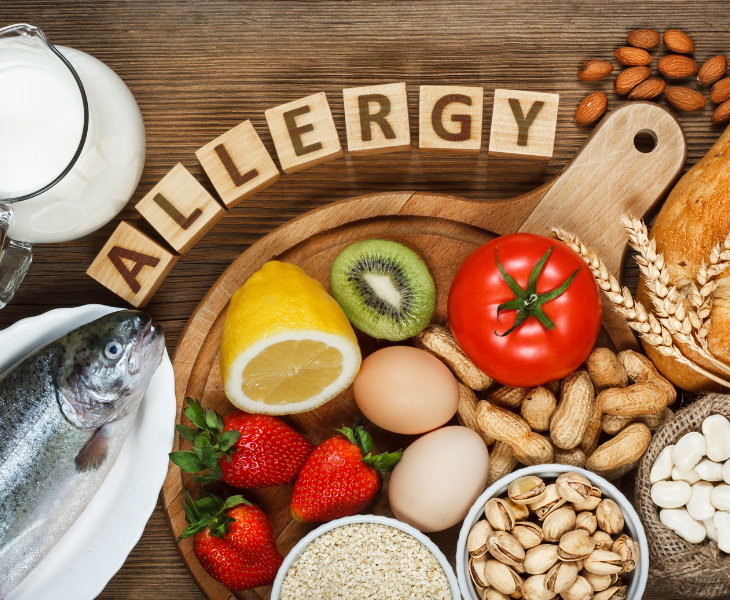Did you know that up to 8% of children and 10% of adults in the U.S. suffer from food allergies? With more people experiencing reactions to everyday foods, it’s natural to ask: Are food allergy genetic?
In this post, we’ll dive into the science behind food allergies, explore whether they run in families, and what you can do if you or your child is at risk.
What Are Food Allergies?
Food allergies occur when the body’s immune system mistakenly identifies certain food proteins as harmful. This leads to an allergic reaction, which can range from mild itching to life-threatening anaphylaxis.
Common Food Allergens
- Peanuts
- Tree nuts
- Milk
- Eggs
- Soy
- Wheat
- Fish
- Shellfish
These are often referred to as the “Big Eight allergens,” accounting for most food allergy cases.
Are Food Allergy Genetic?
Is There a Genetic Link?
Yes, food allergies can be genetic, but it’s not as simple as inheriting a single “allergy gene.” According to the American Academy of Allergy, Asthma & Immunology (AAAAI), genetics play a role in determining susceptibility, especially if both parents have allergies.
Family History Matters
If one parent has any type of allergy (food, pollen, dust, etc.), the child has about a 30% chance of developing an allergy. If both parents are allergic, that risk jumps to 60–80%.
Not Always the Same Allergen
Interestingly, a child might not be allergic to the same food as their parents. A parent may be allergic to shellfish, while the child develops a peanut allergy.
Genes + Environment = Allergy Risk
While genetics influence risk, environmental factors like diet, exposure to microbes, and even how a baby is born (C-section vs. vaginal) can also shape the immune system.
How Food Allergies Develop Over Time
Some food allergies begin in infancy, while others appear later in life. For instance, milk and egg allergies often show up early but are sometimes outgrown. On the other hand, peanut or shellfish allergies tend to be lifelong.
Role of the Immune System
A hyperactive immune response is often to blame. For people with genetic predisposition, the immune system wrongly treats food proteins as dangerous invaders.
Early Signs and Diagnosis
Being aware of early warning signs can help you seek proper diagnosis and treatment.
Common Symptoms of Food Allergies
- Hives or skin rash
- Itching or swelling of the lips and tongue
- Difficulty breathing or wheezing
- Vomiting or diarrhea
- Dizziness or fainting
If you suspect a food allergy, consult an allergist. Skin prick tests, blood tests, and food challenge tests are commonly used diagnostic tools.
Source: CDC Food Allergy Facts
Can You Prevent Food Allergies?
There’s no guaranteed way to prevent food allergies, but certain measures can reduce risk.
Tips for Allergy Prevention
- Breastfeed exclusively for 4–6 months, if possible.
- Introduce allergenic foods early (around 6 months) — consult your pediatrician first.
- Avoid unnecessary use of antibiotics in early life.
- Maintain a healthy gut microbiome.
According to the LEAP (Learning Early About Peanut Allergy) study, early introduction of peanuts reduced allergy risk by up to 80% in high-risk children.
Managing Food Allergies in the Family
If allergies run in your family, it’s important to be proactive.
Create an Allergy-Safe Home
- Read food labels carefully
- Avoid cross-contamination in the kitchen
- Educate family and caregivers about allergy safety
- Keep epinephrine auto-injectors (EpiPens) accessible
Working with a Specialist
A board-certified allergist can guide testing, management, and help with desensitization therapy if needed.
Quick Facts at a Glance
| Question | Answer |
|---|---|
| Are food allergies hereditary? | Yes, there’s a genetic component |
| Will my child have my allergies? | Possibly, but not necessarily same ones |
| Can food allergies be outgrown? | Yes, especially milk, eggs, soy |
| Can you prevent them entirely? | No, but you can reduce the risk |
Final Thoughts
So, are food allergy genetic? Yes, but genetics are only part of the puzzle. Lifestyle, environment, and early food exposure also shape a person’s allergy profile. If allergies run in your family, staying informed and proactive is the best defense.
Call to Action
Do food allergies run in your family? Share your experiences in the comments below.
Want to learn more about food allergies and natural ways to support immune health?
Check out our Plant-Based Wellness Guides
Stay updated with trusted health resources like the Food Allergy Research & Education (FARE) and CDC.








